牛津译林版英语七年级下Unit 5 Amazing things Grammar课件(共50张PPT)
文档属性
| 名称 | 牛津译林版英语七年级下Unit 5 Amazing things Grammar课件(共50张PPT) | 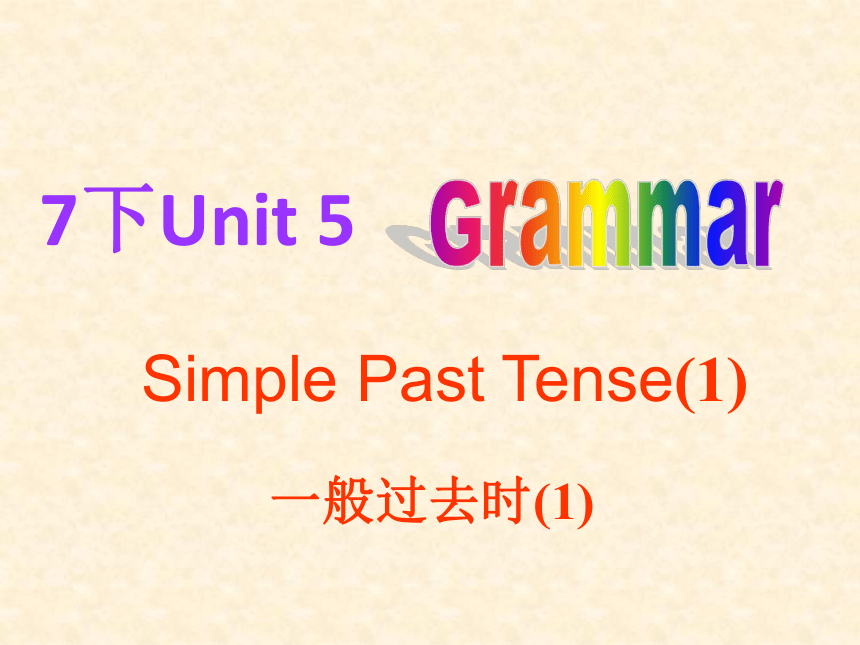 | |
| 格式 | zip | ||
| 文件大小 | 2.0MB | ||
| 资源类型 | 教案 | ||
| 版本资源 | 牛津译林版 | ||
| 科目 | 英语 | ||
| 更新时间 | 2022-02-18 23:06:32 | ||
图片预览

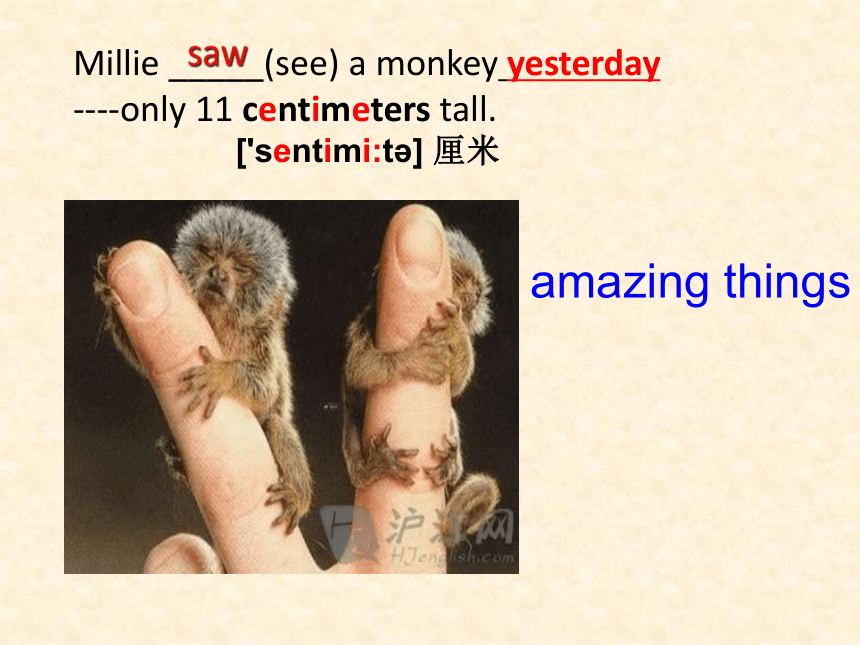
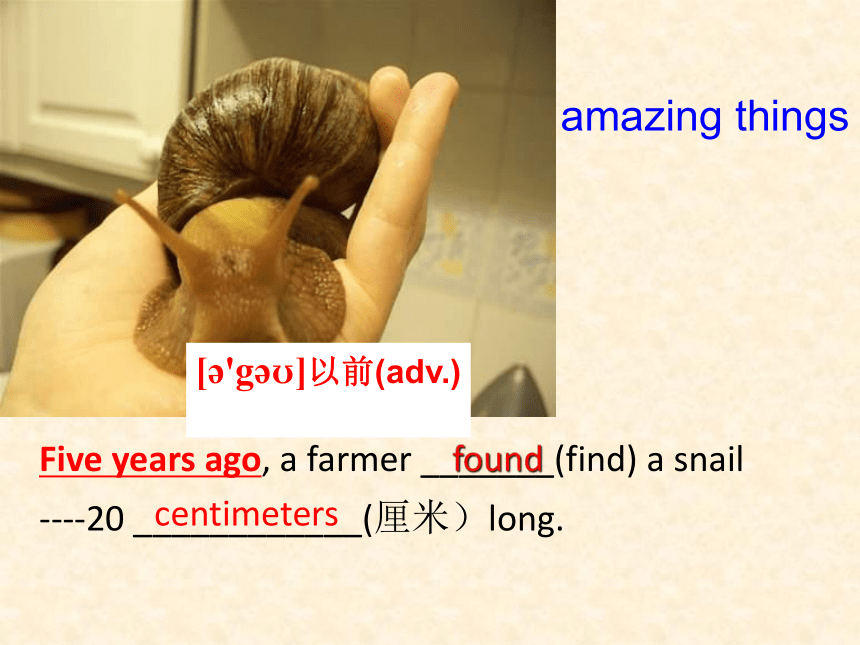
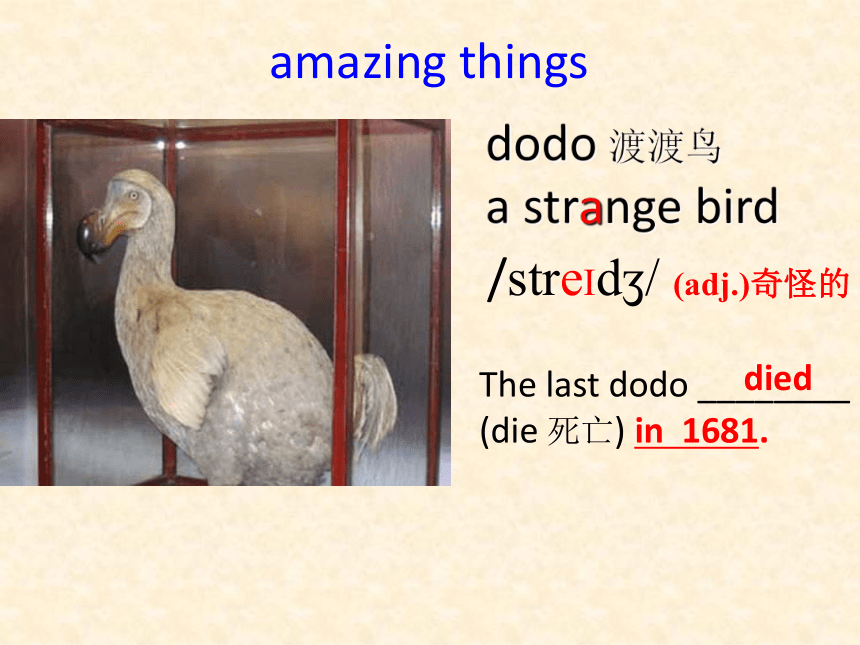
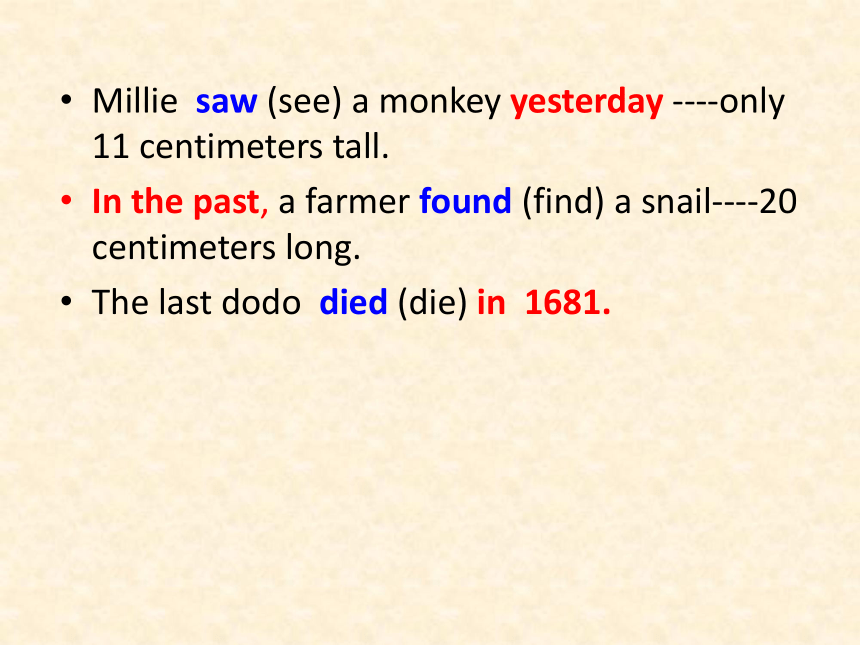
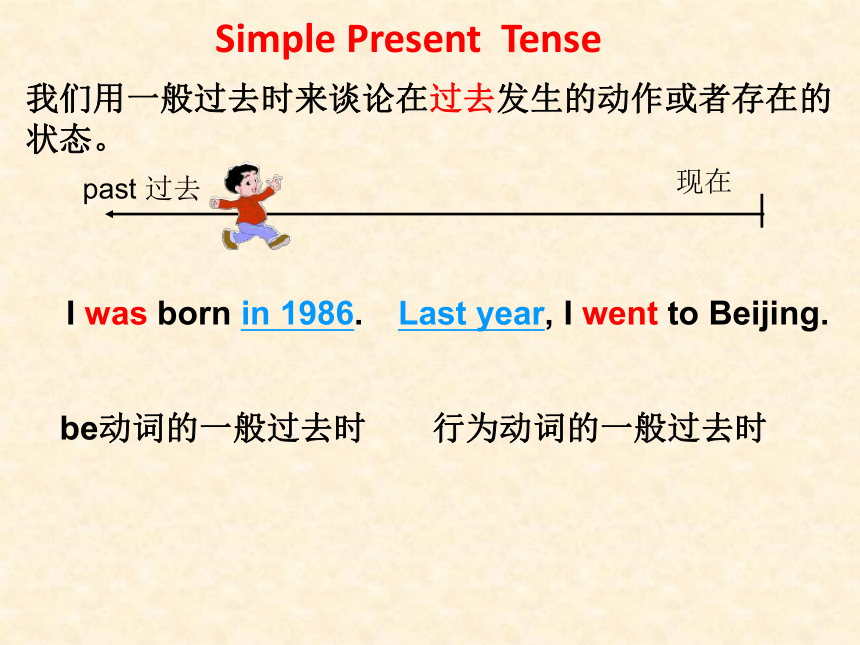
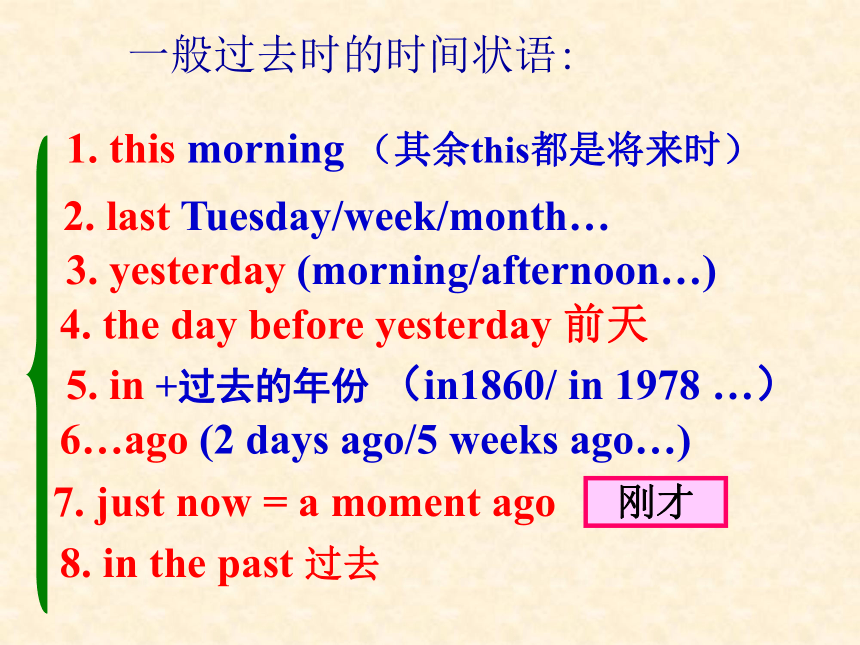
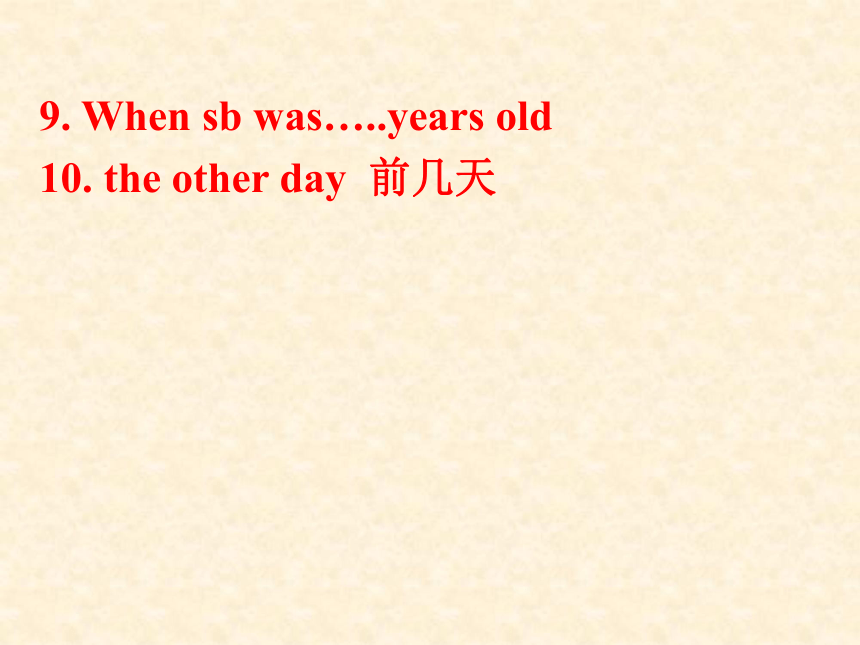
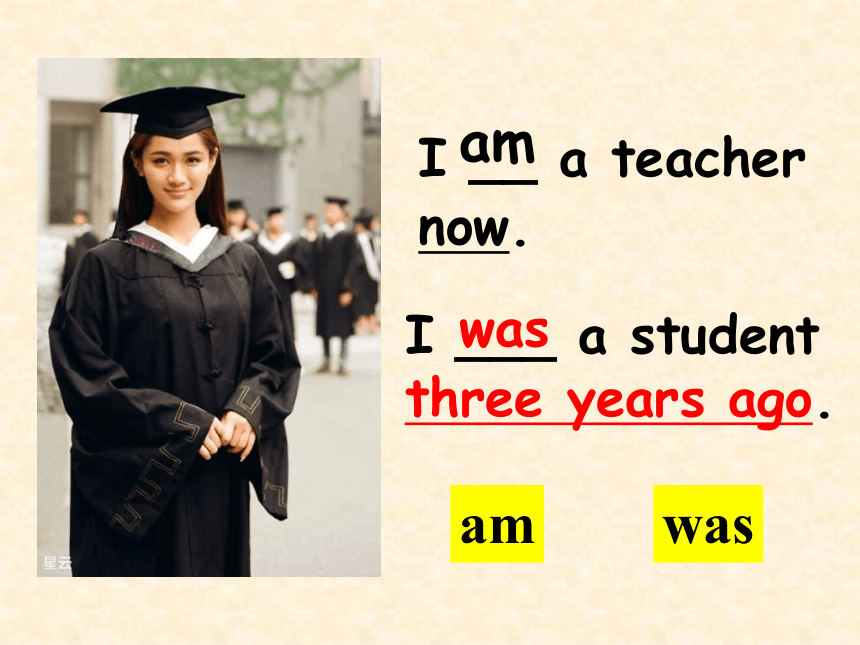
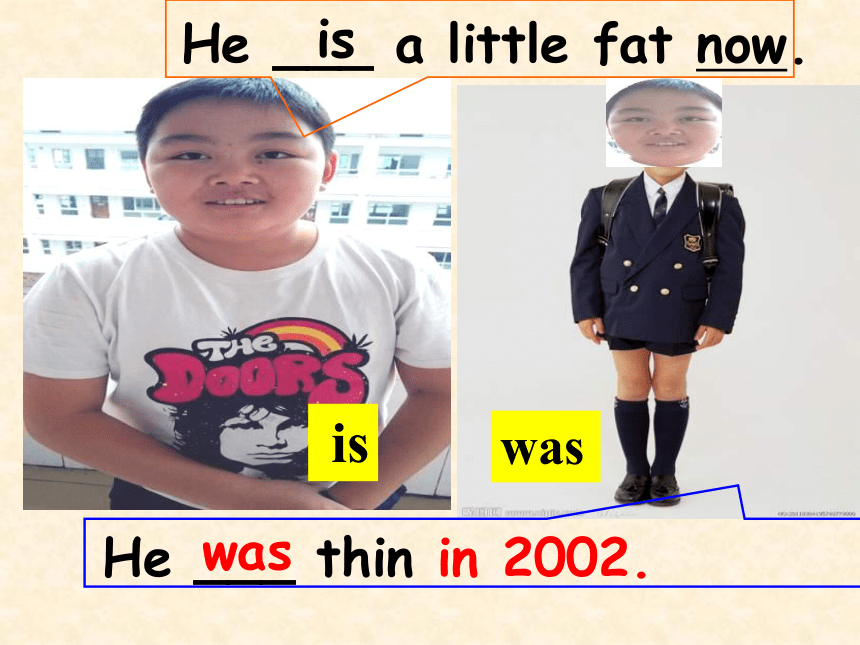
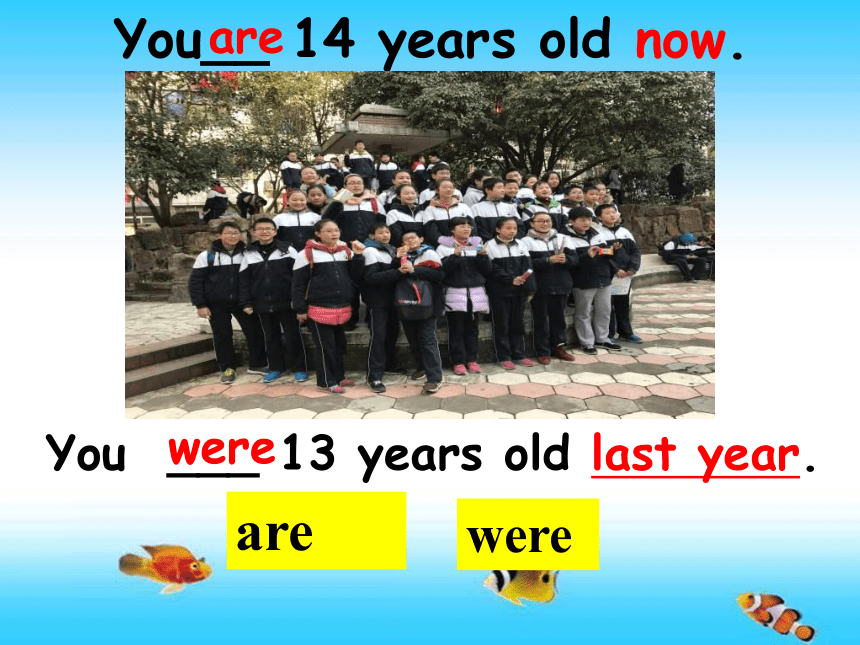
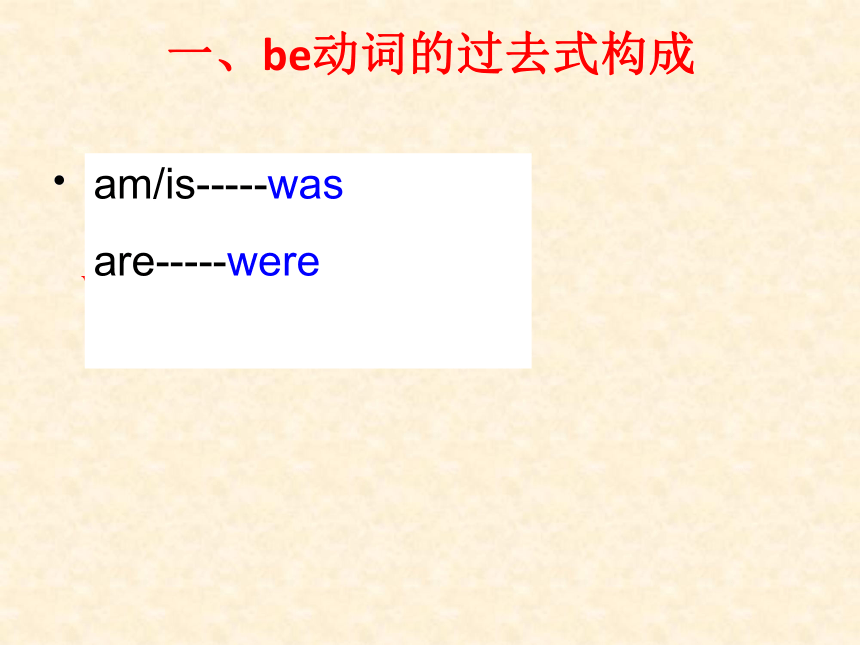
文档简介
(共50张PPT)
Simple Past Tense(1)
7下Unit 5
一般过去时(1)
Millie _____(see) a monkey yesterday ----only 11 centimeters tall.
saw
amazing things
['sentimi:t ] 厘米
Five years ago, a farmer _______(find) a snail
----20 ____________(厘米)long.
found
centimeters
amazing things
[ 'g ]以前(adv.)
amazing things
The last dodo ________
(die 死亡) in 1681.
dodo 渡渡鸟
a strange bird
died
/streId / (adj.)奇怪的
Millie saw (see) a monkey yesterday ----only 11 centimeters tall.
In the past, a farmer found (find) a snail----20 centimeters long.
The last dodo died (die) in 1681.
我们用一般过去时来谈论在过去发生的动作或者存在的状态。
现在
Last year, I went to Beijing.
I was born in 1986.
past 过去
be动词的一般过去时
行为动词的一般过去时
Simple Present Tense
一般过去时的时间状语:
2. last Tuesday/week/month…
3. yesterday (morning/afternoon…)
1. this morning (其余this都是将来时)
6…ago (2 days ago/5 weeks ago…)
4. the day before yesterday 前天
5. in +过去的年份 (in1860/ in 1978 …)
7. just now = a moment ago
刚才
8. in the past 过去
9. When sb was…..years old
10. the other day 前几天
I __ a teacher now.
I ___ a student three years ago.
am
was
was
am
was
He ___ a little fat now.
is
He ___ thin in 2002.
is
was
You__ 14 years old now.
are
are
were
You ___ 13 years old last year.
were
一、be动词的过去式构成
was(肯)
were(肯)
I/ She/ He/ It
We/They/ You
am/is-----was
are-----were
Lucy is slim now.
But she ___ ____ slim five years ago.
5 years ago now
was not
now in 2001
Julie is white now.
But she ___ ____ white in 2001.
was not
now last month
These apples are red now.
But they ___ ____ red last month.
were not
The shoes are clean today because my mother washed them.
But they ___ ____ clean yesterday.
were not
yesterday
today
But she was not slim five years ago.
But she was not white in 2001.
But they were not red last month.
But they were not clean yesterday.
一、be动词过去式构成
was(肯) / was not(否)
were(肯) / were not(否)
2. 一般疑问:Was/ Were…….
回答:Yes,…..was/were. (肯定)
No,..…wasn’t/ weren’t. (否定)
I/ She/ He/ It
We/They/ You
= wasn’t
= weren’t
1. 他们昨天早上在家吗?是的,他们在家。
Were they at home yesterday morning
Yes, they were.
2. 他两年前是个医生吗 不,他不是。
Was he a doctor two years ago
No, he wasn’t.
二、行为动词的过去式构成
2. 以e结尾的动词
+d
1. 绝大数动词直接+ ed
live lived hope hoped use used
look looked walk walked start started
二、行为动词的过去式构成
4. 以元音字母+y结尾的动词,直接+ed
3.以辅音字母+y结尾的动词, 去y+ied
study studied
carry carried
play played
stay stayed
二、行为动词的过去式构成
5. 以一个元音字母+一个辅音字母结尾的动词, 双写辅音字母+ed
stop stopped
plan planned
chat chatted
1 绝大多数动词 +ed walk—walked
2 以e结尾的动词 +d live—lived
3 以辅音字母+y结尾的动词 变y为i+ed study—studied
4 以一个元音字母+一个辅音字母结尾的动词 双写末尾的辅音字母+ed stop—stopped
二、行为动词的过去式构成
want— talk —
like — worry —
try — stop —
wanted
talked
liked
worried
tried
stopped
写出下列动词的过去式。
三、规则动词-ed的读音
1、清念 /t/ ,即 ed 在清辅音后面念 /t/ ,
finished helped passed cooked
2、元浊 /d/ ,即 ed 在元音,浊辅音后面念 /d/ ,
borrowed enjoyed raised lived
3、/t/, /d/ 之后念 /Id/ , 即 ed 在 /t/ /d/ 音后面念 /Id/
wanted shouted needed counted
/ t/ /pt/ /st/ /kt/
/ ud/ / Id/ /zd/ /vd/
/tId/ /tId/ /dId/ /dId/
1 没有变化 cost-cost put-put
2 改变了元音 write-wrote know-knew
3 改变了辅音 make-made spend-spent
4 面目全非 leave-left teach-taught
5 其他的 am/is-was are-were
不规则动词的过去式构成
start ______
love _________
play ______
plan ______
9. leave _____
10. tell _____
11. stand _____
12. bring ______
5. reply _____
6. say ________
7. meet _____
8. hear ______
started
played
loved
planned
said
replied
left
met
stood
told
heard
brought
Finish Part A on page 62.
This morning, we _____ (go) to the Fun World Museum. When we ____ (get) to the museum, there _____ (be) a lot of people there. We _____ (spend) three hours in the museum. I ____ (take) a lot of photos. Some of us _______ (buy) cards of the animals there. We _____ (come) back to school at 1 p.m. We ____ (have) a great time!
went
were
spent
took
bought
came
had
got
Finish Part B on page 62.
Millie: We _____ (go) to the Fun World Museum
the day before yesterday, Daniel. It ____
(be) so interesting!
Daniel: Really Tell me all about it.
Millie: OK. We ____ (see) a small monkey, only
11 centimetres tall.
Daniel: That’s amazing! What else
Millie: We also _____ (learn) about some
strange birds like dodos. They _____ (live)
on the earth a long time ago.
Daniel: That’s cool!
went
saw
was
learnt
lived
Finish Part C on page 62.
Simple Past Tense(2)
一般过去时 (2)
I get up at six every morning.
I don’t get up at six every morning.
He walks to school every day.
He doesn’t walk to school every day.
They play football in the park at weekends.
They don’t play football in the park at weekends.
把下列句子改成否定句
don’t/ doesn’t + 动原
I got up at six yesterday.
I did not get up at six yesterday.
He walked to school two days ago.
He did not walk to school two days ago.
They played football in the park last Sunday.
They did not play football in the park last Sunday.
把下列句子改成否定句
did not (didn’t) + 动原
四、含有行为动词的句子的过去时
1 肯定:主语+ 动词ed + 其他
否定:主语+ did not (=didn’t) + 动原
I planned to go to Nanjing last week. (改成否定句
I didn’t plan to go to Nanjing last week.
She loved eating hamburgers three years ago.
She didn’t love eating hamburgers three years ago.
Two weeks ago, you went on a trip to Oriental Saltlake Resort. (东方盐湖城).
Can you tell me something about your trip two weeks ago
Did you go there by bus
Did it rain that day
Did you see elephants there
Did you have fun
Ask and answer (I)
Yes, we did.
Yes, it did.
No, we didn’t.
Yes, we did.
四、含有行为动词的句子的过去时
肯定:主语+ 动词ed + 其他
否定:主语+ did not (=didn’t) + 动原
一般疑问句:Did + 主语 + 动原?
回答:Yes,….did./ No, …didn’t.
How long did it take you to go there by bus
What animals did you see there
Who did you play with
When did you come back
How did you feel after the trip
Ask and answer (II)
I saw….
I played with….
We came back at…
I felt…..
It took us…
Can you tell me something about your trip two weeks ago
四、含有行为动词的句子的过去时
1. 肯定:主语+ 动词ed + 其他
2. 否定:主语+ did not (=didn’t) + 动原
3. 一般疑问句:Did + 主语+ 动原?
回答:Yes,….did./ No, …didn’t.
4. 特殊疑问句:特殊疑问词 + did + 主语+ 动原?
Guessing game
Did she...
Yes, she did. No, she didn’t.
yesterday
Did he...
Yes, he did. No, he didn’t.
last Sunday
Yes, she did. No, she didn’t.
Did she...
in 2004
Did they...
Yes, they did. No, they didn’t.
last week
Did they...
Yes, they did. No, they didn’t.
the day before yesterday
Did they...
Yes, they did. No, they didn’t.
yesterday afternoon
Yesterday was Sunday. I _____ the park and _______ a good time. Simon did not ________ football. He _______ playing volleyball with his friend. Kitty likes shopping. She ______some shopping with her mum yesterday afternoon. Daniel did not ____out yesterday. He ________ at home and ________some books.
visited
had
play
practised
did
go
stayed
read
Finish exercise A on Page 74.
Finish exercise B on Page74
Sandy: ______ you and your family _______(go) camping last week
Simon: No, we _______. We _______(go) camping last month.
Sandy: _____ (be) it interesting
Sandy: Yes, it ______.
Sandy: What ______ you ______(do) there
Did
go
didn’t
went
was
did
do
Was
Simon: We ______(put) up our tent near a lake. My cousin Annie and I ______(be) very happy. We also _______(row) a boat on the lake.
Sandy: _____ you _______(stay) outside all night
Simon: Yes, we ______. The camping trip _______(be) really wonderful.
put
were
rowed
Did
stay
was
did
1. Lucy did her homework at home.(改否定句)
Lucy ______ ___ her homework at home.
2. He found some meat in the fridge. (变一般疑问句)
____ he ____ _____ meat in the fridge
3. She stayed there for a week. (对划线部分提问)
______ ____ ______ she ______ there
4. There was some orange in the cup. (变一般疑问句)
_____ there _______ orange in the cup
5.She went to school on foot this morning.(用everyday改)
Exercise
didn't
do
Did
find
any
How
long
did
stay
Was
any
She goes to school on foot every day.
Task 1
1. It was a cloudy day yesterday.
一般疑问句:
Was it a cloudy day yesterday
肯定回答:
Yes, it was.
否定回答:
2. We sang an English song.
一般疑问句:
Did you sing an English song
No, we didn’t.
否定句:
We didn’t sing an English song.
Simple Past Tense(1)
7下Unit 5
一般过去时(1)
Millie _____(see) a monkey yesterday ----only 11 centimeters tall.
saw
amazing things
['sentimi:t ] 厘米
Five years ago, a farmer _______(find) a snail
----20 ____________(厘米)long.
found
centimeters
amazing things
[ 'g ]以前(adv.)
amazing things
The last dodo ________
(die 死亡) in 1681.
dodo 渡渡鸟
a strange bird
died
/streId / (adj.)奇怪的
Millie saw (see) a monkey yesterday ----only 11 centimeters tall.
In the past, a farmer found (find) a snail----20 centimeters long.
The last dodo died (die) in 1681.
我们用一般过去时来谈论在过去发生的动作或者存在的状态。
现在
Last year, I went to Beijing.
I was born in 1986.
past 过去
be动词的一般过去时
行为动词的一般过去时
Simple Present Tense
一般过去时的时间状语:
2. last Tuesday/week/month…
3. yesterday (morning/afternoon…)
1. this morning (其余this都是将来时)
6…ago (2 days ago/5 weeks ago…)
4. the day before yesterday 前天
5. in +过去的年份 (in1860/ in 1978 …)
7. just now = a moment ago
刚才
8. in the past 过去
9. When sb was…..years old
10. the other day 前几天
I __ a teacher now.
I ___ a student three years ago.
am
was
was
am
was
He ___ a little fat now.
is
He ___ thin in 2002.
is
was
You__ 14 years old now.
are
are
were
You ___ 13 years old last year.
were
一、be动词的过去式构成
was(肯)
were(肯)
I/ She/ He/ It
We/They/ You
am/is-----was
are-----were
Lucy is slim now.
But she ___ ____ slim five years ago.
5 years ago now
was not
now in 2001
Julie is white now.
But she ___ ____ white in 2001.
was not
now last month
These apples are red now.
But they ___ ____ red last month.
were not
The shoes are clean today because my mother washed them.
But they ___ ____ clean yesterday.
were not
yesterday
today
But she was not slim five years ago.
But she was not white in 2001.
But they were not red last month.
But they were not clean yesterday.
一、be动词过去式构成
was(肯) / was not(否)
were(肯) / were not(否)
2. 一般疑问:Was/ Were…….
回答:Yes,…..was/were. (肯定)
No,..…wasn’t/ weren’t. (否定)
I/ She/ He/ It
We/They/ You
= wasn’t
= weren’t
1. 他们昨天早上在家吗?是的,他们在家。
Were they at home yesterday morning
Yes, they were.
2. 他两年前是个医生吗 不,他不是。
Was he a doctor two years ago
No, he wasn’t.
二、行为动词的过去式构成
2. 以e结尾的动词
+d
1. 绝大数动词直接+ ed
live lived hope hoped use used
look looked walk walked start started
二、行为动词的过去式构成
4. 以元音字母+y结尾的动词,直接+ed
3.以辅音字母+y结尾的动词, 去y+ied
study studied
carry carried
play played
stay stayed
二、行为动词的过去式构成
5. 以一个元音字母+一个辅音字母结尾的动词, 双写辅音字母+ed
stop stopped
plan planned
chat chatted
1 绝大多数动词 +ed walk—walked
2 以e结尾的动词 +d live—lived
3 以辅音字母+y结尾的动词 变y为i+ed study—studied
4 以一个元音字母+一个辅音字母结尾的动词 双写末尾的辅音字母+ed stop—stopped
二、行为动词的过去式构成
want— talk —
like — worry —
try — stop —
wanted
talked
liked
worried
tried
stopped
写出下列动词的过去式。
三、规则动词-ed的读音
1、清念 /t/ ,即 ed 在清辅音后面念 /t/ ,
finished helped passed cooked
2、元浊 /d/ ,即 ed 在元音,浊辅音后面念 /d/ ,
borrowed enjoyed raised lived
3、/t/, /d/ 之后念 /Id/ , 即 ed 在 /t/ /d/ 音后面念 /Id/
wanted shouted needed counted
/ t/ /pt/ /st/ /kt/
/ ud/ / Id/ /zd/ /vd/
/tId/ /tId/ /dId/ /dId/
1 没有变化 cost-cost put-put
2 改变了元音 write-wrote know-knew
3 改变了辅音 make-made spend-spent
4 面目全非 leave-left teach-taught
5 其他的 am/is-was are-were
不规则动词的过去式构成
start ______
love _________
play ______
plan ______
9. leave _____
10. tell _____
11. stand _____
12. bring ______
5. reply _____
6. say ________
7. meet _____
8. hear ______
started
played
loved
planned
said
replied
left
met
stood
told
heard
brought
Finish Part A on page 62.
This morning, we _____ (go) to the Fun World Museum. When we ____ (get) to the museum, there _____ (be) a lot of people there. We _____ (spend) three hours in the museum. I ____ (take) a lot of photos. Some of us _______ (buy) cards of the animals there. We _____ (come) back to school at 1 p.m. We ____ (have) a great time!
went
were
spent
took
bought
came
had
got
Finish Part B on page 62.
Millie: We _____ (go) to the Fun World Museum
the day before yesterday, Daniel. It ____
(be) so interesting!
Daniel: Really Tell me all about it.
Millie: OK. We ____ (see) a small monkey, only
11 centimetres tall.
Daniel: That’s amazing! What else
Millie: We also _____ (learn) about some
strange birds like dodos. They _____ (live)
on the earth a long time ago.
Daniel: That’s cool!
went
saw
was
learnt
lived
Finish Part C on page 62.
Simple Past Tense(2)
一般过去时 (2)
I get up at six every morning.
I don’t get up at six every morning.
He walks to school every day.
He doesn’t walk to school every day.
They play football in the park at weekends.
They don’t play football in the park at weekends.
把下列句子改成否定句
don’t/ doesn’t + 动原
I got up at six yesterday.
I did not get up at six yesterday.
He walked to school two days ago.
He did not walk to school two days ago.
They played football in the park last Sunday.
They did not play football in the park last Sunday.
把下列句子改成否定句
did not (didn’t) + 动原
四、含有行为动词的句子的过去时
1 肯定:主语+ 动词ed + 其他
否定:主语+ did not (=didn’t) + 动原
I planned to go to Nanjing last week. (改成否定句
I didn’t plan to go to Nanjing last week.
She loved eating hamburgers three years ago.
She didn’t love eating hamburgers three years ago.
Two weeks ago, you went on a trip to Oriental Saltlake Resort. (东方盐湖城).
Can you tell me something about your trip two weeks ago
Did you go there by bus
Did it rain that day
Did you see elephants there
Did you have fun
Ask and answer (I)
Yes, we did.
Yes, it did.
No, we didn’t.
Yes, we did.
四、含有行为动词的句子的过去时
肯定:主语+ 动词ed + 其他
否定:主语+ did not (=didn’t) + 动原
一般疑问句:Did + 主语 + 动原?
回答:Yes,….did./ No, …didn’t.
How long did it take you to go there by bus
What animals did you see there
Who did you play with
When did you come back
How did you feel after the trip
Ask and answer (II)
I saw….
I played with….
We came back at…
I felt…..
It took us…
Can you tell me something about your trip two weeks ago
四、含有行为动词的句子的过去时
1. 肯定:主语+ 动词ed + 其他
2. 否定:主语+ did not (=didn’t) + 动原
3. 一般疑问句:Did + 主语+ 动原?
回答:Yes,….did./ No, …didn’t.
4. 特殊疑问句:特殊疑问词 + did + 主语+ 动原?
Guessing game
Did she...
Yes, she did. No, she didn’t.
yesterday
Did he...
Yes, he did. No, he didn’t.
last Sunday
Yes, she did. No, she didn’t.
Did she...
in 2004
Did they...
Yes, they did. No, they didn’t.
last week
Did they...
Yes, they did. No, they didn’t.
the day before yesterday
Did they...
Yes, they did. No, they didn’t.
yesterday afternoon
Yesterday was Sunday. I _____ the park and _______ a good time. Simon did not ________ football. He _______ playing volleyball with his friend. Kitty likes shopping. She ______some shopping with her mum yesterday afternoon. Daniel did not ____out yesterday. He ________ at home and ________some books.
visited
had
play
practised
did
go
stayed
read
Finish exercise A on Page 74.
Finish exercise B on Page74
Sandy: ______ you and your family _______(go) camping last week
Simon: No, we _______. We _______(go) camping last month.
Sandy: _____ (be) it interesting
Sandy: Yes, it ______.
Sandy: What ______ you ______(do) there
Did
go
didn’t
went
was
did
do
Was
Simon: We ______(put) up our tent near a lake. My cousin Annie and I ______(be) very happy. We also _______(row) a boat on the lake.
Sandy: _____ you _______(stay) outside all night
Simon: Yes, we ______. The camping trip _______(be) really wonderful.
put
were
rowed
Did
stay
was
did
1. Lucy did her homework at home.(改否定句)
Lucy ______ ___ her homework at home.
2. He found some meat in the fridge. (变一般疑问句)
____ he ____ _____ meat in the fridge
3. She stayed there for a week. (对划线部分提问)
______ ____ ______ she ______ there
4. There was some orange in the cup. (变一般疑问句)
_____ there _______ orange in the cup
5.She went to school on foot this morning.(用everyday改)
Exercise
didn't
do
Did
find
any
How
long
did
stay
Was
any
She goes to school on foot every day.
Task 1
1. It was a cloudy day yesterday.
一般疑问句:
Was it a cloudy day yesterday
肯定回答:
Yes, it was.
否定回答:
2. We sang an English song.
一般疑问句:
Did you sing an English song
No, we didn’t.
否定句:
We didn’t sing an English song.
